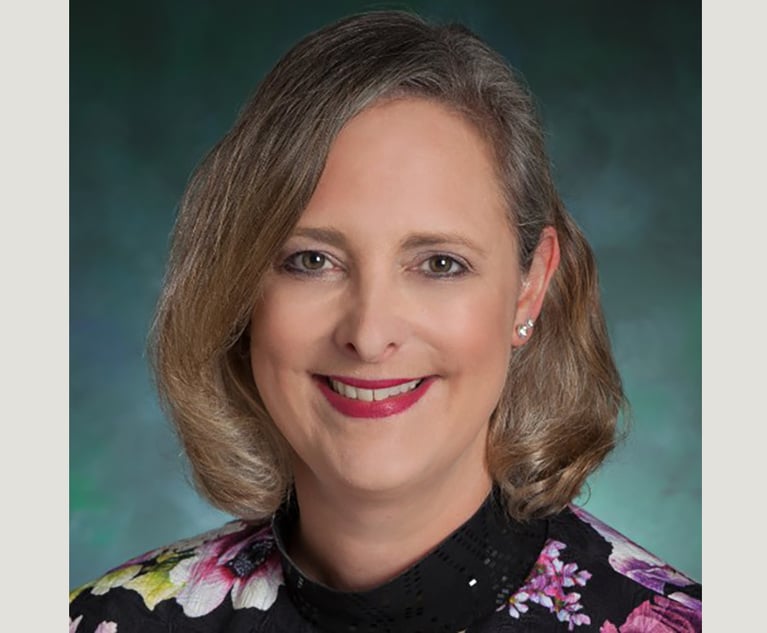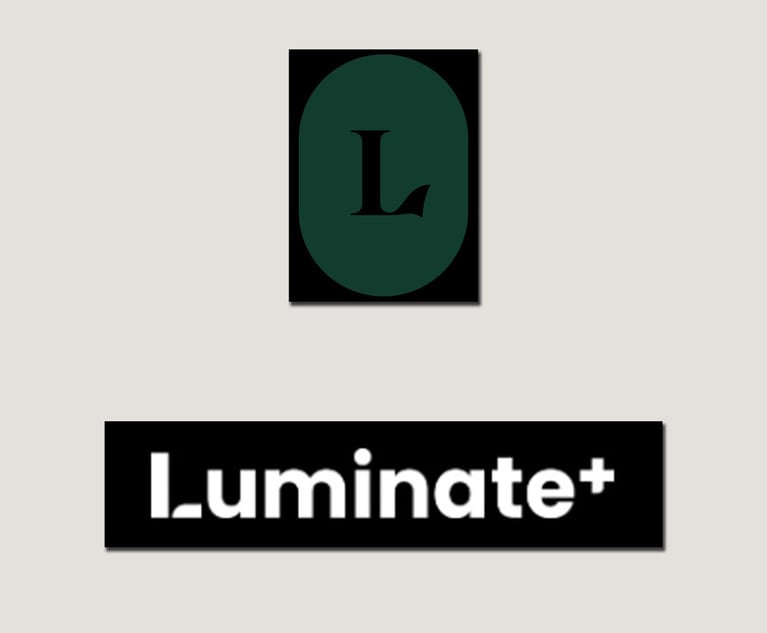Supreme Court decision says directors can speak freely
Corporate officers and directors can express their honestly held opinions without liability under Section 11 of the Securities Act of 1933even if those opinions later turn out to be falseso long as they believed those opinions to be true at the time they said it.
May 27, 2015 at 08:00 PM
4 minute read
The Supreme Court recently gave corporate directors and officers some welcome relief. The Court confirmed that corporate officers and directors can express their honestly held opinions without liability under Section 11 of the Securities Act of 1933—even if those opinions later turn out to be false—so long as they believed those opinions to be true at the time they said it (with some caveats, of course).
In the March issue of InsideCounsel, I wrote about Omnicare, Inc. v. Laborers District Counsel Construction Industry Pension Fund. At that time, we didn't know how the Supreme Court would rule, but we were prepared for it to potentially disrupt the status quo when it came to statements made under Section 11.
As a reminder, Omnicare, a pharmacy service for long-term care facilities, made certain claims regarding its legal compliance in the registration statement for its initial public offering (IPO). After the IPO, serious allegations surfaced about alleged illegal activities, such as kickbacks and the falsification of Medicare and Medicaid claims.
Unsurprisingly, plaintiffs challenged the original IPO disclosure under Section 11, saying that there should be Section 11 liability since it turned out that the statements made about Omnicare's legal compliance were false.
Omnicare argued that the persons making those statements about compliance believed them to be true at the time they were made, so they shouldn't be held liable under Section 11.
The federal circuit courts were split on this issue, which is why the Supreme Court ultimately stepped in.
The 6th Circuit was rigid in its approach to strict liability under Section 11: Defendants should not win a motion to dismiss even if they subjectively believed the statements to be true. All that mattered to the 6th Circuit was if the statement was objectively false.
The 2nd, 3rd and 9th Circuits, however, had previously held that defendants should be able to win a motion to dismiss if the people making the statements believed them to be true at the time. After some lively proceedings and oral arguments in front of the Supreme Court (keeping in mind this was just another layer of litigation in Omnicare's nine years of legal battles), the Court sided with the 2nd, 3rd and 9th Circuits.
That is, statements made that are believed to be true and later turn out to be false won't be liable under Section 11.
People's opinions inherently have a possibility of being false, according to the Court, and the decision stated that “because a statement of opinion admits the possibility of error, such a statement remains true—and thus is not an 'untrue statement of … fact'—even if the opinion turns out to have been wrong.”
However, the Court made a point that persons cannot “assert opinions in statements free from worry.”
Omissions of material information can give way to Section 11 liability, so people are obligated to disclose any facts they may know, meaning facts that would conflict with the understanding of the statement.
From the Court's opinion: “Thus, if a registration statement omits material facts about the issuer's inquiry into or knowledge concerning a statement of opinion, and if those facts conflict with what a reasonable investor would take from the statement itself, then Section 11's omissions clause creates liability.”
The Court clarified that it does not expect a person to disclose every fact known; however, it does expect facts to be disclosed that “cannot be squared with a fair reading of the registration statement as a whole.”
While Omnicare offers some helpful clarity when it comes to Section 11 liability, the challenge is still the art of disclosure. Too many irrelevant disclosures make for exhausting statements, and too little of the right type leave you possibly liable under Section 11.
This content has been archived. It is available through our partners, LexisNexis® and Bloomberg Law.
To view this content, please continue to their sites.
Not a Lexis Subscriber?
Subscribe Now
Not a Bloomberg Law Subscriber?
Subscribe Now
NOT FOR REPRINT
© 2025 ALM Global, LLC, All Rights Reserved. Request academic re-use from www.copyright.com. All other uses, submit a request to [email protected]. For more information visit Asset & Logo Licensing.
You Might Like
View All
Global Software Firm Trying to Jump-Start Growth Hands CLO Post to 3-Time Legal Chief

In-House Legal Network The L Suite Acquires Legal E-Learning Platform Luminate+

Antitrust in Trump 2.0: Expect Gap Filling from State Attorneys General
6 minute readTrending Stories
- 1NJ Supreme Court Clarifies Affidavit of Merit Requirement for Doctor With Dual Specialties
- 2Whether to Choose State or Federal Court in a Case Involving a Franchise?
- 3Am Law 200 Firms Announce Wave of D.C. Hires in White-Collar, Antitrust, Litigation Practices
- 4K&L Gates Files String of Suits Against Electronics Manufacturer's Competitors, Brightness Misrepresentations
- 5'Better of the Split': District Judge Weighs Circuit Divide in Considering Who Pays Decades-Old Medical Bill
Who Got The Work
J. Brugh Lower of Gibbons has entered an appearance for industrial equipment supplier Devco Corporation in a pending trademark infringement lawsuit. The suit, accusing the defendant of selling knock-off Graco products, was filed Dec. 18 in New Jersey District Court by Rivkin Radler on behalf of Graco Inc. and Graco Minnesota. The case, assigned to U.S. District Judge Zahid N. Quraishi, is 3:24-cv-11294, Graco Inc. et al v. Devco Corporation.
Who Got The Work
Rebecca Maller-Stein and Kent A. Yalowitz of Arnold & Porter Kaye Scholer have entered their appearances for Hanaco Venture Capital and its executives, Lior Prosor and David Frankel, in a pending securities lawsuit. The action, filed on Dec. 24 in New York Southern District Court by Zell, Aron & Co. on behalf of Goldeneye Advisors, accuses the defendants of negligently and fraudulently managing the plaintiff's $1 million investment. The case, assigned to U.S. District Judge Vernon S. Broderick, is 1:24-cv-09918, Goldeneye Advisors, LLC v. Hanaco Venture Capital, Ltd. et al.
Who Got The Work
Attorneys from A&O Shearman has stepped in as defense counsel for Toronto-Dominion Bank and other defendants in a pending securities class action. The suit, filed Dec. 11 in New York Southern District Court by Bleichmar Fonti & Auld, accuses the defendants of concealing the bank's 'pervasive' deficiencies in regards to its compliance with the Bank Secrecy Act and the quality of its anti-money laundering controls. The case, assigned to U.S. District Judge Arun Subramanian, is 1:24-cv-09445, Gonzalez v. The Toronto-Dominion Bank et al.
Who Got The Work
Crown Castle International, a Pennsylvania company providing shared communications infrastructure, has turned to Luke D. Wolf of Gordon Rees Scully Mansukhani to fend off a pending breach-of-contract lawsuit. The court action, filed Nov. 25 in Michigan Eastern District Court by Hooper Hathaway PC on behalf of The Town Residences LLC, accuses Crown Castle of failing to transfer approximately $30,000 in utility payments from T-Mobile in breach of a roof-top lease and assignment agreement. The case, assigned to U.S. District Judge Susan K. Declercq, is 2:24-cv-13131, The Town Residences LLC v. T-Mobile US, Inc. et al.
Who Got The Work
Wilfred P. Coronato and Daniel M. Schwartz of McCarter & English have stepped in as defense counsel to Electrolux Home Products Inc. in a pending product liability lawsuit. The court action, filed Nov. 26 in New York Eastern District Court by Poulos Lopiccolo PC and Nagel Rice LLP on behalf of David Stern, alleges that the defendant's refrigerators’ drawers and shelving repeatedly break and fall apart within months after purchase. The case, assigned to U.S. District Judge Joan M. Azrack, is 2:24-cv-08204, Stern v. Electrolux Home Products, Inc.
Featured Firms
Law Offices of Gary Martin Hays & Associates, P.C.
(470) 294-1674
Law Offices of Mark E. Salomone
(857) 444-6468
Smith & Hassler
(713) 739-1250







